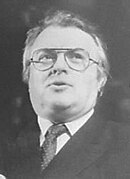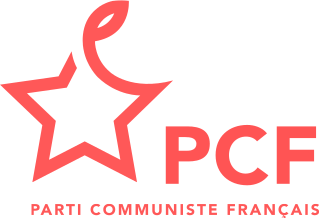
The French Communist Party is a communist party in France. The PCF is a member of the Party of the European Left, and its MEPs sit with The Left in the European Parliament – GUE/NGL group.

The Rally for the Republic was a Gaullist and conservative political party in France. Originating from the Union of Democrats for the Republic (UDR), it was founded by Jacques Chirac in 1976 and presented itself as the heir of Gaullist politics. It was one of the two major parties in French politics, alongside the Socialist Party. On 21 September 2002, the RPR was merged into the Union for the Presidential Majority, later renamed the Union for a Popular Movement (UMP).

The Union for French Democracy was a centre-right political party in France. The UDF was founded in 1978 as an electoral alliance to support President Valéry Giscard d'Estaing in order to counterbalance the Gaullist preponderance over the political right in France. This name was chosen due to the title of Giscard d'Estaing's 1976 book, Démocratie française.
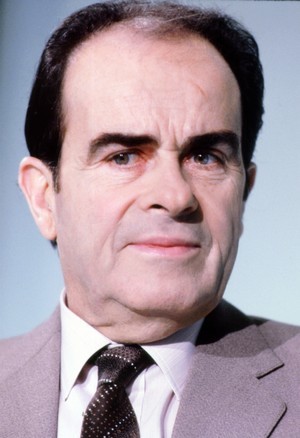
Georges René Louis Marchais was the head of the French Communist Party (PCF) from 1972 to 1994, and a candidate in the 1981 French presidential election.
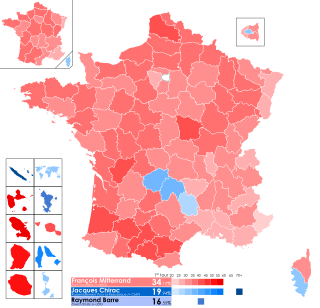
Presidential elections were held in France on 24 April and 8 May 1988.

Presidential elections were held in France in 1974, following the death of President Georges Pompidou. They went to a second round, and were won by Valéry Giscard d'Estaing by a margin of 1.6%. It is to date the closest presidential election in French history.

Legislative elections were held in France on 10 June and 17 June 2007 to elect the 13th National Assembly of the Fifth Republic, a few weeks after the presidential election run-off on 6 May. 7,639 candidates stood for 577 seats, including France's overseas possessions. Early first-round results projected a large majority for President Nicolas Sarkozy's Union for a Popular Movement (UMP) and its allies; however, second-round results showed a closer race and a stronger left. Nevertheless, the right retained its majority from 2002 despite losing some 40 seats to the Socialists.

Legislative elections were held in France on 21 and 28 March 1993, to elect the tenth National Assembly of the Fifth Republic.

Legislative elections were held in France on 5 and 12 June 1988, to elect the ninth National Assembly of the Fifth Republic, one month after the re-election of François Mitterrand as President of France.

Legislative elections were held in France on 16 March 1986 to elect the eighth National Assembly of the Fifth Republic. Contrary to other legislative elections of the Fifth Republic, the electoral system used was that of party-list proportional representation.

Legislative elections were held in France on 12 and 19 March 1978 to elect the sixth National Assembly of the Fifth Republic. On 2 April 1974, President Georges Pompidou died. The non-Gaullist centre-right leader Valéry Giscard d'Estaing was elected to succeed him. Because the Gaullist Union of Democrats for the Republic was the largest party in the pro-Giscard majority in the Assembly, Giscard chose Jacques Chirac to lead the cabinet. This period was one of renovation for Gaullism.

Legislative elections were held in France on 4 and 11 March 1973, to elect the fifth National Assembly of the Fifth Republic.
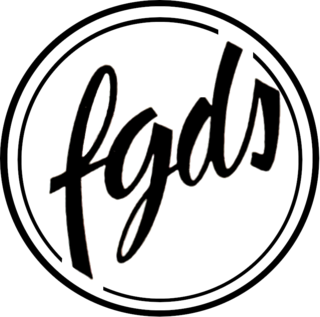
The Federation of the Democratic and Socialist Left was a conglomerate of French left-wing non-Communist forces. It was founded to support François Mitterrand's candidature at the 1965 presidential election and to counterbalance the Communist preponderance over the French left.
The Epinay Congress was the third national congress of the French Socialist Party, which took place on 11, 12 and 13 June 1971, in the town of Épinay-sur-Seine, in the northern suburbs of Paris. During this congress, not only did the party admit the Convention of Republican Institutions into its ranks, but the party leadership was also won by Mitterrand and his supporters. For the observers and the French Socialists themselves, the Epinay Congress was the real founding act of the current PS. It was also the turning point in Mitterrand's grand political plan, which led to the ascendancy of the French Left over the next quarter-century, and eventually, in 1981, to Mitterrand's election to the Presidency of France for two consecutive 7-year terms.
The Gauche Plurielle was a left-wing coalition in France, composed of the Socialist Party, the French Communist Party, the Greens, the Left Radical Party, and the Citizens' Movement. Succeeding Alain Juppé's conservative government, the Plural Left governed France from 1997 to 2002. It was another case of cohabitation between rival parties at the head of the state and of the government. Following the failure of the left in the 2002 legislative election, it was replaced by another conservative government, this time headed by Jean-Pierre Raffarin.
The Metz Congress was the seventh national congress of the French Socialist Party which took place on 6, 7 and 8 April 1979. The debate was influenced by the failure to update the Common Programme with the French Communist Party, and the unexpected defeat of the "Union of Left" at the 1978 legislative election.
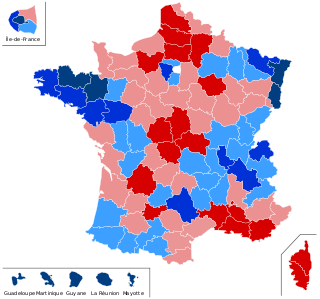
A referendum on the Maastricht Treaty for the founding of the European Union was held in France on 20 September 1992. It was approved by 51% of the voters. The result of the referendum, known as the "petit oui", along with the Danish "No" vote (50,7%) are considered to be signals of a transition of public opinion on European integration, away from the "permissive consensus" which had existed in most member states until then. From this point forward issues relating to European integration were subject to more intensive discussions across much of Europe, and later overt euroscepticism gained prominence. Only France, Ireland and Denmark held referendums on the Maastricht Treaty ratification.

Municipal elections were held in France on 6 and 13 March 1983. President François Mitterrand and leader of the Socialist Party held power since May 1981.

The Socialist Party is a centre-left to left-wing political party in France. It holds social-democratic and pro-European views. The PS was for decades the largest party of the "French Left" and used to be one of the two major political parties under the Fifth Republic, along with the Rally for the Republic in the late 20th century, and with the Union for a Popular Movement in the early 2000s. It is currently led by First Secretary Olivier Faure. The PS is a member of the Party of European Socialists, Progressive Alliance and Socialist International.

The French Communist Party has been a part of the political scene in France since 1920, peaking in strength around the end of World War II. It originated when a majority of members resigned from the socialist French Section of the Workers' International (SFIO) party to set up the French Section of the Communist International (SFIC). The SFIO had been divided over support for French participation in World War I and over whether to join the Communist International (Comintern). The new SFIC defined itself as revolutionary and democratic centralist. Ludovic-Oscar Frossard was its first secretary-general, and Ho Chi Minh was also among the founders. Frossard himself resigned in 1923, and the 1920s saw a number of splits within the party over relations with other left-wing parties and over adherence to the Communist International's dictates. The party gained representation in the French parliament in successive elections, but also promoted strike action and opposed colonialism. Pierre Semard, leader from 1924 to 1928, sought party unity and alliances with other parties; but leaders including Maurice Thorez imposed a Stalinist line from the late 1920s, leading to loss of membership through splits and expulsions, and reduced electoral success. With the rise of Fascism this policy shifted after 1934, and the PCF supported the Popular Front, which came to power under Léon Blum in 1936. The party helped to secure French support for the Second Spanish Republic during the Spanish Civil War and opposed the 1938 Munich Agreement with Hitler. During this period the PCF adopted a more patriotic image, and favoured an equal but distinct role for women in the communist movement.

